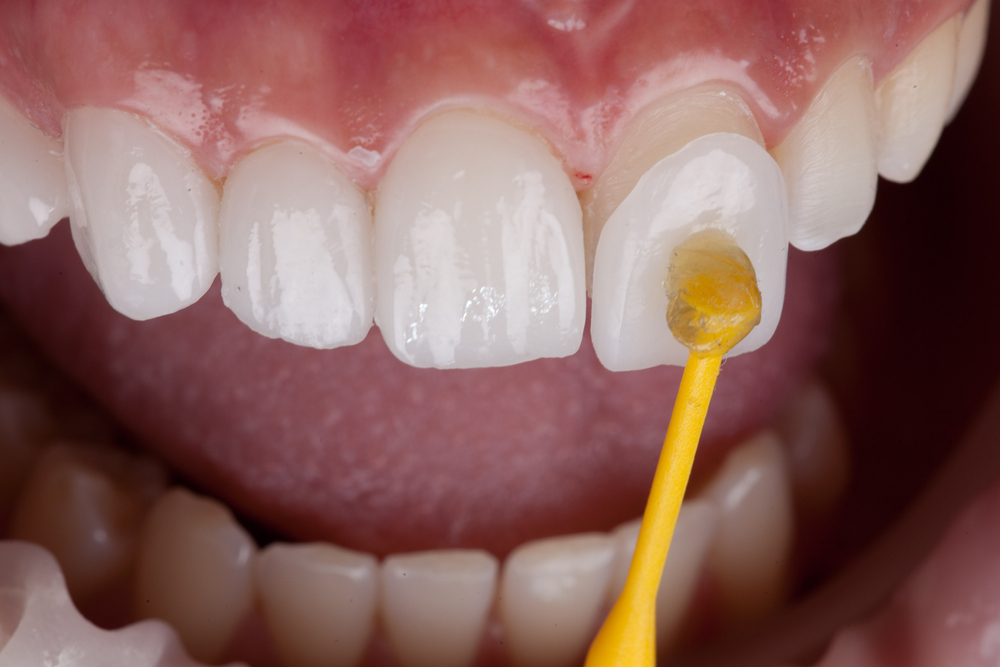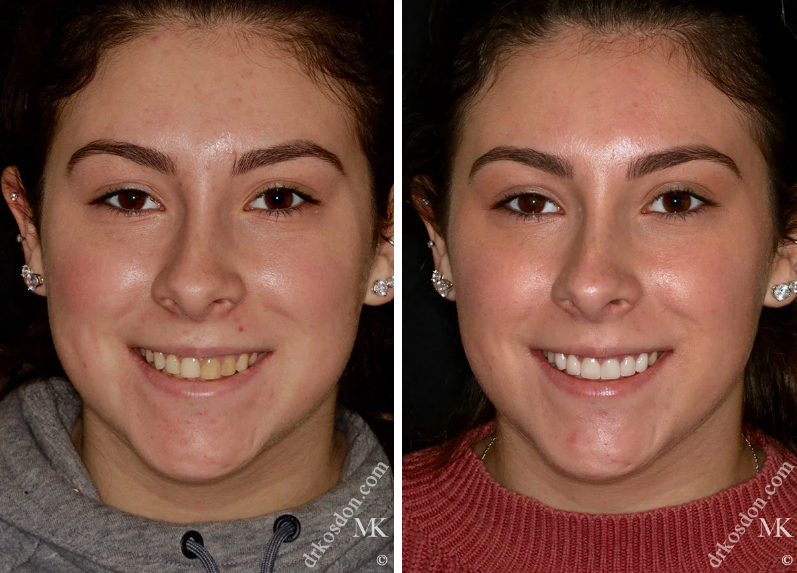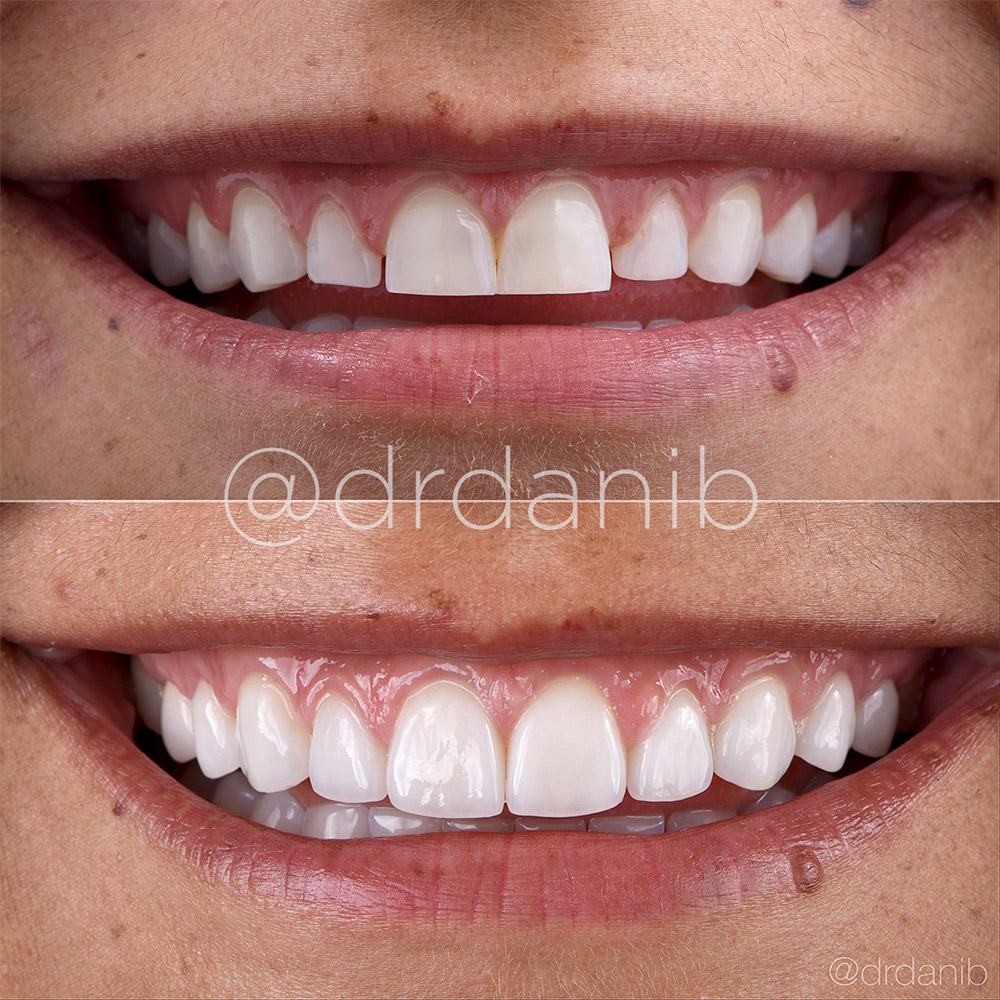Tips From Porcelain Veneers Dentist for a Seamless Procedure
Wiki Article
Unlocking the Tricks of Veneers: Truths, Kinds, and Benefits for a Lovely Smile
Veneers use an engaging service for those looking for to enhance their smiles. These oral enhancements can attend to different blemishes, from discoloration to imbalance. With options like porcelain and composite, people can choose based on their needs and choices. Recognizing the subtleties of veneers, including application and care, is vital. What variables should one consider prior to deciding? The answers may amaze those interested in this aesthetic oral option.
Understanding Veneers: What Are They?
Veneers are slim, tailor-made coverings developed to cover the front surface of teeth, boosting their appearance. Typically crafted from long lasting materials, these shells are tailored to fit each person's teeth specifically. They serve several purposes, including remedying visual imperfections such as staining, chips, or voids. The application process involves a dental practitioner preparing the teeth, usually by eliminating a percentage of enamel to assure a tight fit. Once prepared, the veneers are bound to the teeth utilizing a solid adhesive.Patients commonly pick veneers for their ability to create a natural-looking smile while supplying a long-lasting option to oral blemishes. Unlike other cosmetic dentistry choices, veneers need very little intrusive procedures, making them a popular choice. The result is a better smile that can substantially improve a person's self-confidence and self-esteem. Overall, veneers offer an effective method to accomplishing an extra unified and appealing dental appearance.
Sorts of Veneers: Porcelain vs. Composite
When thinking about aesthetic oral alternatives, 2 main kinds of veneers stand apart: porcelain and composite. Porcelain veneers are crafted from a long lasting ceramic material that mimics the natural appearance of teeth. They are recognized for their tarnish resistance and capability to reflect light likewise to natural enamel, providing a visual charm that several patients desire. The application process usually involves even more prep work of the tooth framework and may require several brows through to the dental practitioner.On the various other hand, composite veneers are made from a tooth-colored material that is directly put on the teeth. This type allows for quicker application and can often be completed in a solitary see. While they are cheaper than porcelain veneers, they may not offer the same durability or resistance to staining. Eventually, the option between porcelain and composite veneers depends upon specific preferences, budget plan, and certain dental requirements.
The Benefits of Deciding On Veneers
Choosing veneers provides many advantages that can considerably improve both the aesthetics and performance of a person's smile. One of the main advantages is their ability to remedy imperfections such as staining, voids, and misalignment, leading to an extra uniform appearance. Veneers can also enhance the resilience of teeth, giving a protective layer that guards them from damages.They need very little tooth preparation compared to other dental procedures, protecting even more of the all-natural tooth structure. This conservation adds to a healthier oral atmosphere while still achieving a sensational smile.
Veneers are very customizable, permitting individuals to select the form, size, and shade that finest matches their choices. Furthermore, they are stain-resistant, making it less complicated to maintain a eye-catching and bright smile in time. Generally, veneers offer a reliable choice for those seeking both aesthetic improvement and lasting oral wellness benefits.
The Veneer Application Refine
The veneer application procedure includes a number of key steps to guarantee suitable outcomes. At first, a consultation is performed to evaluate the client's requirements, complied with by the preparation and shaping of the teeth. Finally, the veneers are bound in position, with modifications produced a perfect fit and look.Preliminary Consultation Steps
A thorough preliminary consultation is vital for any individual considering veneers, as it establishes the structure for a successful treatment. Throughout this meeting, the oral professional assesses the person's dental wellness, going over any existing concerns that could affect the veneer application. This analysis might consist of X-rays and a visual exam to establish the condition of the teeth and gum tissues.The dental professional also engages the person in an in-depth conversation regarding their visual objectives, preferences, and expectations. They may present different veneer options customized to the patient's certain demands. In addition, the expert explains the procedure, possible threats, and aftercare requirements, making certain that the patient is well-informed and comfortable prior to proceeding with the treatment.
Prep Work and Shaping Teeth
After the preliminary consultation, the following stage includes the prep work and shaping of the teeth to accommodate the veneers. This vital step is carried out by the dentist, who thoroughly assesses the tooth framework to establish the quantity of enamel that needs to be eliminated. Generally, a slim layer, normally around 0.5 millimeters, is slashed off to assure an appropriate fit for the veneers. Precision is extremely important during this process, as it affects both the overall Dental Veneers convenience and the aesthetic outcome. When the teeth are effectively formed, impacts are taken to create customized veneers that straighten perfectly with the client's dental account. This careful prep work sets the stage for an effective veneer application, enhancing both appearance and feature.Bonding and Final Changes
Following the shaping and preparation of the teeth, the bonding process begins, noting an important stage in the veneer application. Throughout this stage, an oral adhesive is put on the ready tooth surface, assuring a strong bond between the tooth and the veneer. The dental professional carefully places the veneer, making adjustments to attain the desired alignment and aesthetic appeals. When correctly placed, a special light is made use of to heal the adhesive, strengthening the bond. After healing, the dental professional performs last adjustments, cutting any type of excess product and improving the veneer's form to guarantee an all-natural appearance. This careful attention to information enhances both feature and aesthetic appeals, adding to a total stunning smile that is resilient and resilient.Taking care of Your Veneers: Upkeep Tips
Caring for veneers is necessary to keep their look and longevity. A consistent everyday cleansing regimen, conscious avoidance of discoloring foods, and routine dental check-ups are essential components of reliable maintenance. These techniques aid ensure that veneers stay in peak condition and continue to improve one's smile.Daily Cleansing Regimen
Regularly maintaining veneers is vital for their longevity and look. An appropriate everyday cleansing regimen can help maintain their sparkle and stop damages. Dental professionals recommend brushing twice a day with a soft-bristled toothbrush and fluoride toothpaste, ensuring that all surfaces are cleansed delicately to stay clear of scraping the veneer surface. Flossing everyday is additionally important to eliminate food particles and plaque from between teeth, where brushes might not reach. In addition, using an antimicrobial mouthwash can aid keep oral hygiene without hurting the veneers. It is advisable to prevent unpleasant cleansers and tools that can scrape the veneer. By following these easy actions, people can maintain their veneers looking lovely while advertising overall oral health.Staying Clear Of Discoloration Foods
Although veneers are designed to boost the look of teeth, their sensitivity to tarnishing necessitates cautious dietary selections. It is vital for people with veneers to be mindful of particular foods and drinks that can bring about discoloration. Dark-colored things such as coffee, red a glass of wine, and berry juices need to be consumed in small amounts, as they are understood to discolor both natural teeth and veneers. Furthermore, acidic foods like citrus fruits container compromise the bonding agents made use of in veneers, making them much more susceptible to staining. To preserve an intense smile, it is suggested to rinse the mouth with water after taking in staining foods and to practice regular oral health. These thoughtful choices contribute considerably to the longevity and aesthetics of veneers.
Routine Oral Exams

Keeping the honesty of veneers calls for a dedication to regular oral examinations, as these visits play a vital role in ensuring their long life and look. Throughout these gos to, dental specialists can analyze the condition of the veneers, inspecting for any indications of wear, damages, or underlying oral concerns. Additionally, regular cleanings help eliminate plaque and tartar that can gather around the veneers, advertising general dental health and wellness. Dental experts can additionally provide personalized advice on treatment strategies and products suited for veneer upkeep. By adhering to a schedule of exams, individuals can address prospective troubles early, ensuring their smile remains attractive and vibrant. Eventually, normal oral gos to are a vital element of veneer treatment.
Is Veneers the Right Option for You?
Choosing whether veneers are the right choice typically rests on private dental needs and visual goals. For those seeking to address issues such as staining, chips, or misalignment, veneers can give a transformative solution. Candidates normally include individuals with healthy and balanced teeth however prefer an enhanced smile.
It is vital to take into account variables such as tooth enamel problem, the extent of oral problems, and the desire to keep veneers. Consulting with a dental expert is necessary, as they can review oral health and establish if veneers are ideal
Furthermore, potential prospects should review the long-term commitment, as veneers might call for substitute every 10-15 years. Expense considerations additionally play a substantial role, as veneers can be a considerable financial investment. Eventually, the choice ought to be knowledgeable, balancing aesthetic desires with sensible considerations for long-term results.
Often Asked Inquiries
How Much Time Do Veneers Normally Last Before Needing Replacement?
Veneers commonly last in between 10 to 15 years before needing replacement. Factors such as oral health, lifestyle selections, and material high quality can influence their durability, making routine oral check-ups vital for preserving their condition.Are Veneers Safe for People With Sensitive Teeth?
Veneers can be risk-free for people with sensitive teeth, however it usually relies on the seriousness of sensitivity and the dentist's method. Consulting a dental professional before proceeding is important to guarantee excellent end results.Can Veneers Be Gotten Rid Of or Replaced Conveniently?

Do Veneers Stain Over Time, and Exactly How Can I Stop It?
Veneers can tarnish gradually, especially from foods and drinks like coffee or red white wine. To avoid discoloration, keeping great oral hygiene, utilizing a straw for beverages, and normal oral cleansings are recommended techniques.What Is the Expense Range for Getting Veneers?
The expense of veneers typically ranges from $500 to $2,500 per tooth, depending on variables such as product type, dental practitioner experience, and location. Patients need to speak with dental specialists for individualized quotes and financing options.When the teeth are properly formed, impacts are taken to develop custom veneers that straighten completely with the person's oral account. Throughout this phase, a dental adhesive is used to the prepared tooth surface, guaranteeing a strong bond between the veneer and the tooth. It is vital to take right into account elements such as tooth enamel condition, the degree of oral issues, and the readiness to preserve veneers. Veneers can be risk-free for individuals with delicate teeth, but it often depends on the extent of level of sensitivity and the dental expert's method. The cost of veneers normally ranges from $500 to $2,500 per tooth, depending on variables such as material kind, dental professional experience, and area.
Report this wiki page